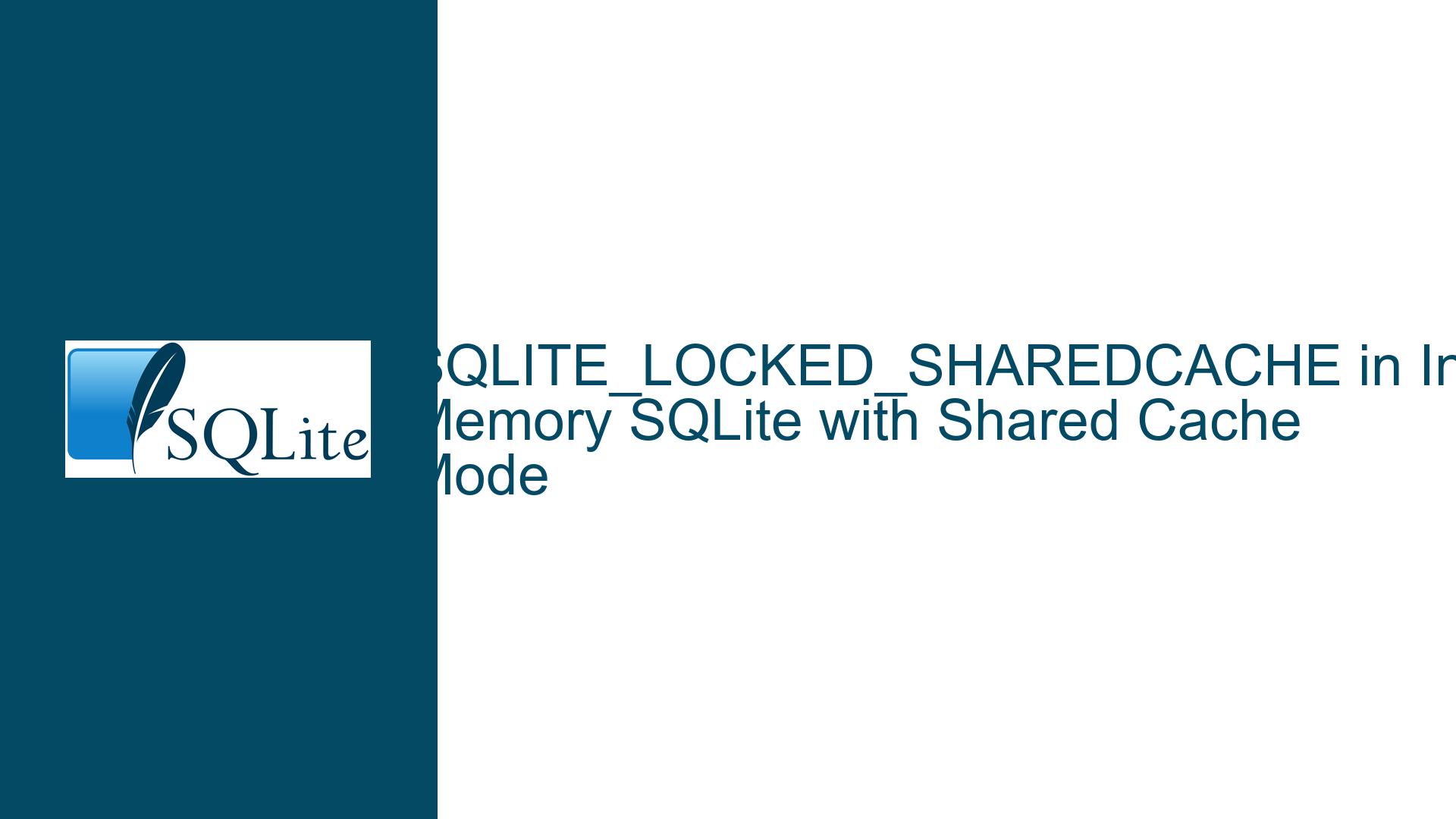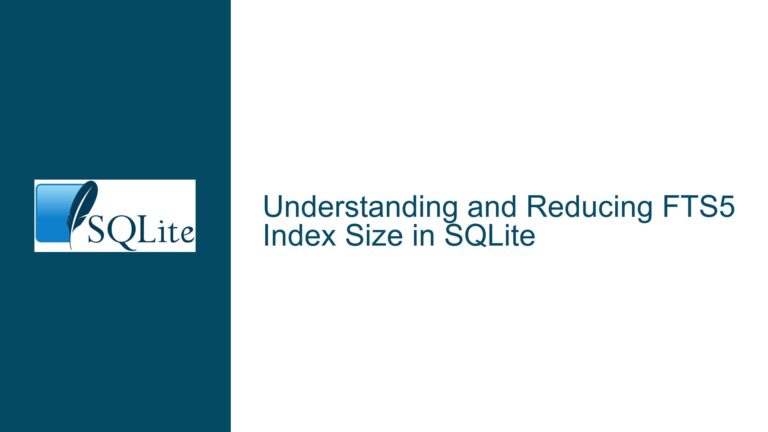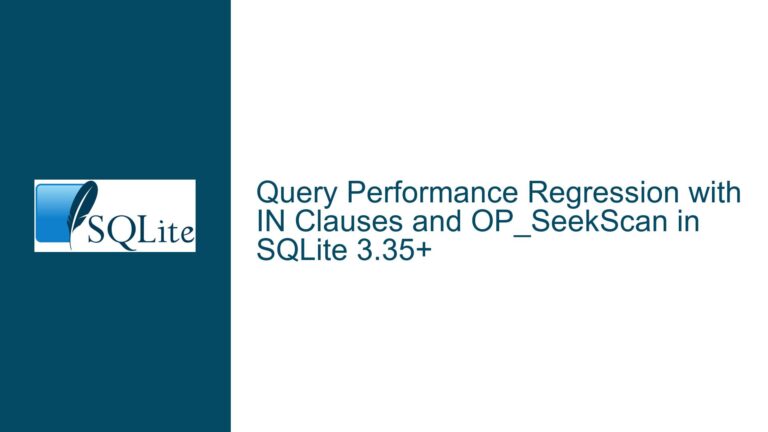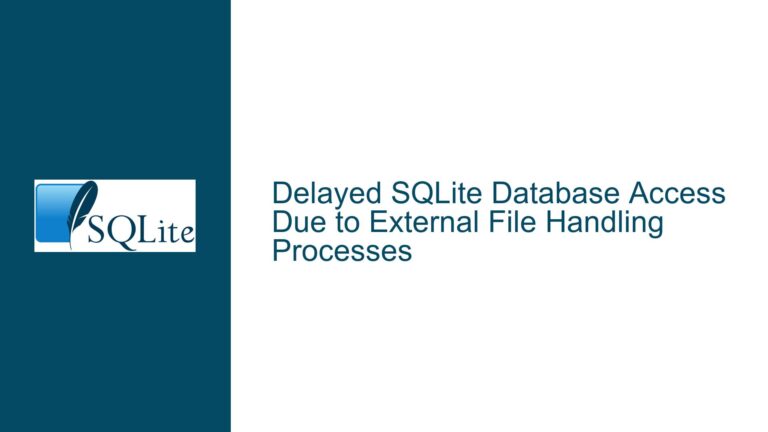SQLITE_LOCKED_SHAREDCACHE in In-Memory SQLite with Shared Cache Mode
SQLITE_LOCKED_SHAREDCACHE in Multi-Threaded Environments with Shared Cache
The issue at hand revolves around the intermittent occurrence of the SQLITE_LOCKED_SHAREDCACHE error in an SQLite in-memory database configured with shared cache mode. This error typically arises when multiple database connections contend for access to the same shared cache, particularly when one connection holds an exclusive lock on a resource. The scenario described involves a Java application using MyBatis and the SQLite JDBC driver, with multiple threads accessing the database. While one thread is responsible for inserting data, others are reading data. Despite setting the PRAGMA read_uncommitted to 1 to allow reading uncommitted changes, the error persists intermittently, leading to contention and failed operations.
The SQLITE_LOCKED_SHAREDCACHE error is explicitly tied to the shared cache mode in SQLite, where multiple connections share the same cache. When one connection holds an exclusive lock—often due to a write operation or a schema modification—other connections attempting to read or write to the same cache will encounter this error. The error message indicates that the database table is locked due to contention with another database connection sharing the cache. This behavior is expected in shared cache mode, but the intermittent nature of the error suggests that certain operations or configurations are exacerbating the contention.
The application in question uses MyBatis for database interactions, with the SQLite JDBC driver configured to use an in-memory database with shared cache mode enabled. The configuration includes setting the transaction isolation level to read_uncommitted and disabling synchronous writes (synchronous=OFF). Despite these settings, the error persists, indicating that the root cause lies deeper in the interaction between the threads, the shared cache, and the transaction management.
Contention Due to Intermediate Begin Operations and AutoCommit Changes
The root cause of the SQLITE_LOCKED_SHAREDCACHE error in this scenario is the interaction between multiple threads and the shared cache, particularly when reading threads initiate intermediate BEGIN operations to change the autoCommit setting. In SQLite, the autoCommit setting determines whether each SQL statement is automatically wrapped in a transaction. When autoCommit is set to false, the application must explicitly manage transactions using BEGIN, COMMIT, and ROLLBACK statements. However, changing the autoCommit setting itself can trigger an implicit BEGIN operation, leading to contention in shared cache mode.
In the described application, the reading threads occasionally change the autoCommit setting, which results in an implicit BEGIN operation. This operation contends with the write operations performed by the inserting thread, leading to the SQLITE_LOCKED_SHAREDCACHE error. The contention arises because the BEGIN operation requires an exclusive lock on the database, which conflicts with the shared lock held by other connections. Even though the PRAGMA read_uncommitted setting allows reading uncommitted changes, it does not prevent contention for exclusive locks during transaction management.
Additionally, the use of triggers on the table being accessed could further complicate the scenario. While triggers themselves do not hold exclusive locks, they can introduce additional operations within a transaction, increasing the likelihood of contention. For example, if a trigger performs a write operation, it could escalate the lock level, leading to contention with other connections sharing the cache.
The intermittent nature of the error suggests that the contention is not consistently reproducible but occurs under specific conditions, such as when multiple threads attempt to change the autoCommit setting simultaneously or when a trigger introduces additional operations within a transaction. This behavior aligns with the observation that the error occurs more frequently under high concurrency or when the database schema is modified.
Mitigating Contention with Transaction Mode and Connection Pooling
To address the SQLITE_LOCKED_SHAREDCACHE error, several strategies can be employed to mitigate contention and improve the stability of the application. These strategies focus on optimizing transaction management, connection pooling, and the configuration of the shared cache mode.
Optimizing Transaction Management
One of the primary causes of contention is the implicit BEGIN operations triggered by changes to the autoCommit setting. To mitigate this, the application should avoid changing the autoCommit setting during normal operation. Instead, the autoCommit setting should be configured once when the connection is established and remain unchanged thereafter. This approach reduces the likelihood of contention by minimizing the number of implicit BEGIN operations.
Additionally, the application should explicitly manage transactions using BEGIN, COMMIT, and ROLLBACK statements. By explicitly controlling transactions, the application can ensure that locks are acquired and released in a predictable manner, reducing the likelihood of contention. For example, the inserting thread should explicitly begin a transaction before performing write operations and commit the transaction immediately after completing the writes. Similarly, the reading threads should avoid initiating transactions unless necessary and keep transactions as short as possible.
Configuring Connection Pooling
Connection pooling can also play a significant role in mitigating contention. The application uses MyBatis with a pooled data source, which allows multiple connections to be reused efficiently. However, the pool configuration should be optimized to balance the number of connections and the concurrency requirements of the application.
Increasing the number of connections in the pool can reduce contention by allowing more threads to access the database simultaneously. However, this approach should be used cautiously, as too many connections can lead to resource exhaustion and decreased performance. The optimal number of connections depends on the specific workload and concurrency requirements of the application.
Adjusting Shared Cache Mode Configuration
The shared cache mode configuration can also be adjusted to reduce contention. For example, the PRAGMA journal_mode setting can be configured to use WAL (Write-Ahead Logging) mode, which allows readers and writers to operate concurrently without blocking each other. In WAL mode, readers do not block writers, and writers do not block readers, reducing the likelihood of contention.
Additionally, the PRAGMA synchronous setting can be adjusted to balance performance and durability. Setting synchronous=OFF can improve performance by reducing the number of disk writes, but it also increases the risk of data loss in the event of a crash. For in-memory databases, this risk is mitigated, making synchronous=OFF a viable option.
Implementing a Workaround for Intermediate Begin Operations
As a workaround for the intermediate BEGIN operations triggered by changes to the autoCommit setting, the application can use a custom connection wrapper to intercept and manage the autoCommit changes. This wrapper can ensure that the autoCommit setting is only changed when necessary and that any implicit BEGIN operations are handled in a way that minimizes contention.
For example, the wrapper can track the current autoCommit setting and only allow changes when no transactions are active. If a change is requested while a transaction is active, the wrapper can defer the change until the transaction is committed or rolled back. This approach ensures that the autoCommit setting is changed in a controlled manner, reducing the likelihood of contention.
Example Configuration and Code
Below is an example configuration and code snippet demonstrating the recommended strategies:
<environment id="${db.env}">
<transactionManager type="jdbc"/>
<dataSource type="POOLED">
<property name="driver" value="${db.driver}" />
<property name="url" value="${db.url}"/>
<property name="username" value="${db.username}" />
<property name="password" value="${db.password}" />
<property name="defaultTransactionIsolationLevel" value="1" />
<property name="driver.synchronous" value="OFF" />
<property name="driver.transaction_mode" value="IMMEDIATE"/>
<property name="driver.foreign_keys" value="ON"/>
<property name="poolMaximumActiveConnections" value="10"/>
<property name="poolMaximumIdleConnections" value="5"/>
</dataSource>
</environment>
// Custom connection wrapper to manage autoCommit changes
public class AutoCommitAwareConnection implements Connection {
private final Connection delegate;
private boolean autoCommit;
public AutoCommitAwareConnection(Connection delegate) {
this.delegate = delegate;
this.autoCommit = delegate.getAutoCommit();
}
@Override
public void setAutoCommit(boolean autoCommit) throws SQLException {
if (this.autoCommit != autoCommit) {
if (!delegate.getAutoCommit()) {
// Defer the change until the transaction is committed or rolled back
delegate.commit();
}
delegate.setAutoCommit(autoCommit);
this.autoCommit = autoCommit;
}
}
// Implement other Connection methods by delegating to the delegate
// ...
}
By implementing these strategies, the application can significantly reduce the likelihood of encountering the SQLITE_LOCKED_SHAREDCACHE error and improve the overall stability and performance of the database interactions.






